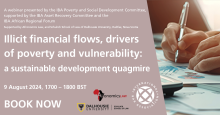The Utility of Radical Transparency and Civic Agency in Solving Africa’s Illicit Financial Flows Crisis
Some of the core objectives of FfD4 are enabling a renewed global financing framework that is underpinned by a commitment to multilateralism and collective action and aligned with national priorities. The African context is especially disadvantaged regarding barriers to meeting these objectives because the political elite, who set the said national priorities and spearhead ‘collective action’, is at the forefront of perpetuating illicit financial flows. The Pandora papers and similar exposés have revealed that African leaders are often at the forefront of illicitly hiding money abroad and moving it around illegally. This creates a paradox, as the very individuals responsible for driving meaningful progress in addressing illicit financial flows are frequently the biggest impediments to such efforts. Peter Ekeh’s concept of the ‘two publics’ provides a compelling theoretical framework for understanding this dynamic.
